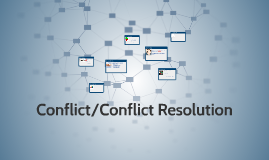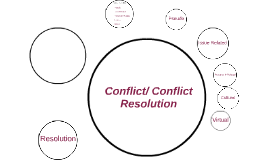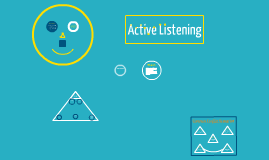Conflict Resolution
Transcript: Assertiveness 5. Be honest and apologizing (don't just be a doormat though) 8. Keep an open mind Various factors may affect a persons ability or willingness to listen at times If you understand the speaker's point of view you will understand why they say or did what they did 1. Be clear on what you wish to be assertive about. Be sure of the real issue at hand to be dealt with. Do not bring up irrelevant issues. 2. Be specific. Do not make broad requests. Being bold will more likely get you better results (stop beating around the bush) 3. Be prepared. Be clear about your intended topic. Have all relevant supporting information available and easily accessible. 4. Be ready to repeat and clarify exactly what you want. The person you wish to be assertive to may deny or try to change the topic. 5. Assertiveness does not mean you will get what you want. It simply helps each party express their desires with an INTENT toward accomplishing a specific goal. 6. Be able to recognize when your work behavior is being critiqued, as opposed to a personal attack. Avoid assumptions as they are likely to induce defensiveness. 7. Avoid aggression. Remember assertive conflict resolution does not mean aggressiveness. Assertion is a balance between passivity and aggression. Aggression has no goal except to vent your emotions. It does not increase the likelihood of accomplishing your desired goal. Use Authority to Settle Conflict 7. Use body language and eye contact How to improve your listening skills by active listening Bibliography Conflict isn’t necessary in life, it just happens Different people value different things, one may place their work highest on their list of priorities whereas another may place their family highest. This can result in conflict at times. e.g. It's Christmas eve and your boss wants you to work late, and you simply want to go home to your family, this is a conflict caused by differing values. Empathy is about openness between people This is generally a situation where both parties can benefit, however it requires both parties trusting each other to follow up on their agreement. 6. Accept the speaker point of view Assertive vs Aggressive 4. Be legitimately interested in the conversation Your religion, your gender, your race, your political views, and your ethnicity can result in conflict with other people. e.g. Two people who have been close friends for many years can no longer stand talking to each other after finding out that the other person doesn't share their political views. 6. Physical discomfort Steps to Assertiveness 3. Be reflective on the other person’s words and what they say What is Assertiveness? Benefits of Successfully Resolving Conflict The best way to build empathy is to help the other person feel that they are understood. That means being an active listener. 2. Lack of time Assertive behavior is more about showing that you will not change your mind and putting your point of view across. Assertiveness isn't supposed to be threatening, just confident. Aggressive behavior is more about getting the other person to change their mind, and acting in a way that is threatening to them. Use Collaboration to Resolve the Conflict Using body language helps and eye contact let the speaker know that you are pay attention and care what they are saying Do not think about your problems or the speaker's other problems because it help you understand the speaker's problem and point of view clearly. Show the person you are listening to them Why Conflict Exists 5 Main Causes of Conflict Listen to each other and each other’s ideas Negotiate some kind of resolution with each other, try to reach a compromise 2. Listen to each other and each other’s ideas Listen by thinking about only the subject at hand and not any other subjects/problems/stories. If you are not interested in the conversation there will be not benefit and the speaker will feel unimportant and ignored. Sometimes you expect people to know things without telling them, which doesn't always apply resulting in conflict due to miscommunication. Making Assumptions Any Questions? We humans are imperfect and full of flaws Be reflective on the other person’s words and what they say Smooth Over the Conflict Skills You Need to Know to be an Active Listener Ignoring or denying a problem does not make it go away, it only gives a temporary escape from the displeasure the problem creates. Without discipline and perseverance we avoid, deny, procrastinate, etc. Without creativity we are unable to see or develop a solution. The goal of assertive behavior is to resolve conflicts in a way that is satisfying for both you and others. When you are assertive, you express problems, feelings, needs, and wants in a way that is both self-satisfying and socially effective. You respect the rights and dignity of both yourself and others. There is a personal focus on reasonable compromise rather than on winning. Solutions are sought that everyone can agree on. Knowledge and

















